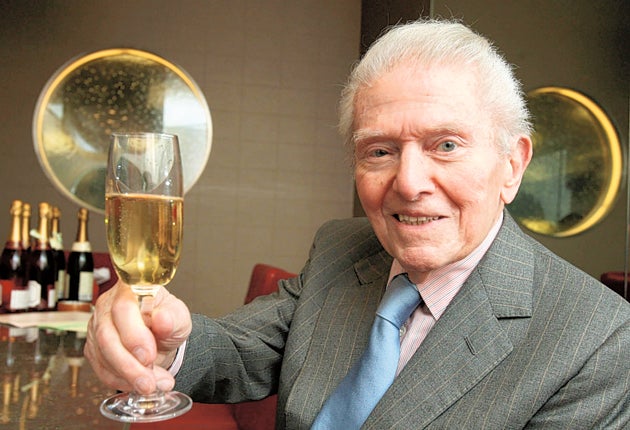Pioneering food critic Egon Ronay dies aged 94
From the 1950s on, the Hungarian restaurateur who settled here transformed Britain's eating habits

Egon Ronay, the Hungarian food critic who transformed British eating habits, died yesterday at the age of 94. Launched in 1957, the Egon Ronay Guide to British Eateries rapidly became the food-lovers' bible, helping to improve the range and quality of British restaurant food, which, by international consensus at the time, was pretty ordinary.
The son of a prominent restaurateur from Budapest, Ronay emigrated to England in 1946 after first the Nazis and then the Russians left the family business in tatters.
He started off managing three restaurants in London owned by a friend of his father's, before borrowing £4,000 to set up his own, the Marquee, near Harrods in 1952. Described as "London's most food-perfect small restaurant" by Fanny Craddock in her Daily Telegraph column, on the menu were classic French dishes unheard of in Fifties Britain. He went on to write his own column for the paper for six years.
But it was the launch of the Egon Ronay Guides that made him the most famous and respected food critic in the UK. Inspired by the French Michelin Guide, the first edition sold 30,000 copies and over the next three decades it became synonymous with good food. Lauded for his integrity, Ronay and his team of anonymous inspectors never accepted a free meal or drink, and restaurants proudly displayed blue plaques in their window for each year they were listed.
With taste buds for talent, Ronay was an early champion of Marco Pierre White and Raymond Blanc, though in recent years he saved his highest praise for Gordon Ramsay. But he was just as passionate about food for the masses after a horrifying early experience at the Victoria Station buffet when he was forced to use a shared teaspoon – hung on a piece of string – to stir his tea.
This led him to cross swords on several occasions with Charles Forte about the quality of food served at the peer's Welcome Break and Little Chef outlets. The quality of airline catering became another bugbear and for four years in the 1990s he worked with the air authority BAA on improving standards.
As a food consultant for the pub chain J D Wetherspoon, he would famously turn up unannounced in a chauffeur-driven limousine to check the crispiness of the onion rings and fluffiness of the baked potatoes.
Last night tributes from the food world poured in about the man whose name will for ever be associated with British cuisine.
The Evening Standard's respected food critic, Fay Maschler, said: "Egon and Raymond Postgate, from the Good Food Guide, were the two scourges of English cuisine."
She added: "But Egon had a particular point of view which came from being a restaurateur himself, and from being Hungarian. He was incredibly involved, active and energetic, and always very important to chefs. He was emblematic of someone who minded about food. I admired him hugely."
Raymond Blanc credits the critic with instilling a sense of self-belief in British chefs. He said: "He managed to really push up the standard of British cuisine. He was meticulous, a visionary, and he knew what gastronomy should be. There's no doubt that he had a huge, huge influence."
The Irish Michelin star chef Richard Corrigan described Egon as the "master of his time": "He was the champion of cooks, he had style. He was the maker and breaker, the critic who put London on the map. There was no shock or horror factor to him, or a need for the spotlight. He just rolled up his sleeves and got on with it."
Ruth Rogers, co-founder of The River Café in London, said Ronay moved this country forward in its attitudes towards food, particularly food from abroad: "He encouraged a real respect and interest in food and restaurants before London became very fashionable. In the very early days, when we started The River Café, he was always extremely supportive."
The TV chef Nigella Lawson said: "We did this show called Taste Testers together about 20 years ago, where we tasted hundreds of packet foods and would judge them. During the filming he tasted baked beans for the first time; he was mystified by them. He kept saying, 'These are really rather good!' He used to say that women had more taste buds than men. But he could bring the seriousness out in anything – even a readymade bread and butter pudding."
Ronay died yesterday morning at his Berkshire home after a short illness with his wife, Barbara, and two daughters by his bedside. He is also survived by a son and a granddaughter.
Join our commenting forum
Join thought-provoking conversations, follow other Independent readers and see their replies
Comments
Bookmark popover
Removed from bookmarks